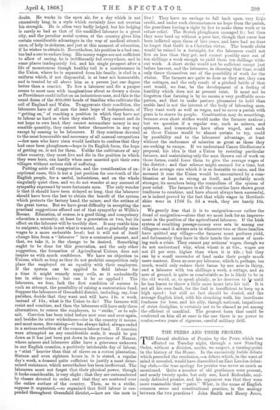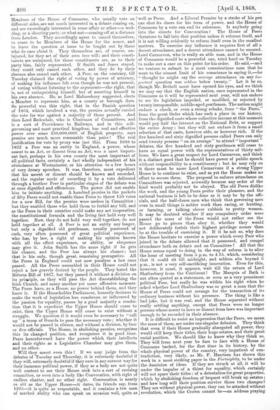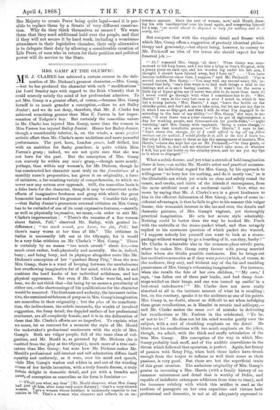THE PEERS AND THEIR PROXIES.
THE formal abolition of Proxies by the Peers, which was effected on Tuesday night, through a new Standing Order, without a division, marks, we suspect, a turning-point in the history of the House. In the excessively feeble debate which preceded the resolution,—a debate which, in the want of mind it revealed, would have discredited an East London debat- ing club,—the true apology for proxies was never so much as mentioned. Quite a number of old gentlemen were present, and nearly twenty spoke, but only one, Lord Redesdale, seri- ously defended proxies, and his argument was that they were more reasonable than "pairs." What, in the name of English common sense and constitutional practice, is the analogy between the two practices ? John Smith and Henry Jones,
Members of the House of Commons, who usually vote on different sides, are not much interested in a debate coming on, and are exceedingly interested in some affair or other—a wed- ding, or a shooting party, or what not—coming off at a distance from London. They accordingly agree to cancel themselves, to cease to be Members of the House for the nonce, and to leave the question at issue to be fought out by those who do care about it. They themselves are, of course, un- injured, for they act of their own free will; and their consti- tuents are uninjured, for those constituents are, as to their party bias, fairly represented. If Smith and Jones stayed, they could only cancel each other, and they do by their absence also cancel each other. A Peer, on the contrary, till Tuesday claimed the right of voting by power of attorney, of making his influence felt even though he was not present, of voting without listening to the arguments—the right, that is, not of extinguishing himself, but of asserting himself in his own absence. He, as Lord Malmesbury suggested, elects a Member to represent him, as a county or borough does. So powerful was this right, that in the Danish question of 1864, which involved a war, the proxies actually carried the vote for war against a majority of those present. And then Lord Redesdale, who is Chairman of Committees, and is a sort of Providence to Railways, and in this self- governing and most practical kingdom, has real and effective power over some 450,000,0001. of English property, says proxies are much more reasonable than pairs ! The real justification for vote by proxy was just this. From 1688 to 1832 a Peer was an entity in England, a power, whose assent to an Act, or dissent from an Act, was a most import- ant fact, perhaps in his own county the most important of all political facts, certainly a fact wholly independent of his attendance at Westminster, or his attention to a few hours of very dreary speeches. It was, therefore, most expedient that his assent or dissent should be known and recorded, and the regular mode of recording it by a vote delivered through a brother Peer in particular stages of the debate was at once dignified and efficacious. The power did not enable him to initiate anything. A hundred proxies in the pockets of fifty Peers would not enable those Peers to throw 150 votes for a new Bill, for the proxies were useless in Committee ; but they enabled those who held them to forbid any bill, and as the Peers in their counties could make any act inoperative, the constitutional formula and the living fact held very well together. Now, they do not hold very well together, do not hold together at all. A Peer is not an entity any longer, but only a dignified old gentleman, usually possessed of cash, very often possessed of great political experience, who has, by law, a right of making his opinion known with all the effect experience, or ability, or eloquence may give it. John Smith has the same right if he gets his chance, and the Peer has always his chance ; but that is his only, though great, remaining prerogative. All the Peers in England could not now paralyze a law once passed. All the Peers assembled in their House could not reject a law gravely desired by the people. They hated the Reform Bill of 1867, but they passed it without a division on its principle, as they will pass the Act disestablishing the Irish Church, and many another yet more offensive measure. The Peers have, as a House, no power behind them, and they know it. If the Householder Parliament, honestly desirous to make the work of legislation less cumbrous, or influenced by the passion for equality, passes by a good majority a resolu- tion that it is expedient the Upper House should cease to exist, then the Upper House will cease to exist without a struggle. We question if it would even be necessary to "call up" a troop of Guards to pass the necessary vote ; whether it would not be passed in silence, and without a division, by four or five officials. The House, in abolishing proxies, recognizes this its changed position, and recognizes it in good time. Peers henceforward have the power which their intellects and their rights as a Legislative Chamber may give them, and no other.
Will they assert even this ? If we may judge from the debates of Tuesday and Thursday, it is extremely doubtful if they will, extremely doubtful if they care in any earnest way for their immense political power, if they as a body are not quite well content to see their House sink into a sort of revising committee, or even into a body like Convocation, with right of endless chatter, and no other right. Convocation is nearly as old as the Upper House—it dates, its friends say, from 1295—it is quite as respectable, and it contains a few men of marked ability who can speak on occasion well, quite as
well as Peers. And a Liberal Premier by a stroke of his pen can shut its doors for his term of power, and the House of Commons by a vote can end its existence. Is anybody going into the streets for Convocation ? The House of Peers threatens to fall into that position unless it reforms itself, and it is not willing evidently to reform itself even in the smallest matters. To exercise any influence it requires first of all a decent attendance, and a decent attendance cannot be secured. Lord Carnarvon, who is really an able man, and in the House of Commons would be a powerful one, tried hard on Tuesday to make out a case on this point for his order. He said,—and we venture to submit to a most 'conscientious man that he went to the utmost limit of his conscience in saving it,—he "thought he might say the average attendance on any im- portant question was seldom below twenty." Let it be so, though Mr. Bethell must have opened his eyes, and we think we may say that the English nation, once represented in the Commons as it will be represented next year, will not endure to see its legislation impeded, or modified, or rejected by twenty irresponsible, middle-aged gentlemen. The nation might endure a check, or even a strong rebuke, from "the Peers," from the great Order which has such a place in our history, from the dignified caste whose collective income at this moment would pay half the interest on the National Debt, or support the entire Army ; but they will not endure it from a small selection of that caste, however able, or however rich. If the five hundred and sixty dignified persons called Peers can only send twenty persons "on an average" to attend " important " debates, the five hundred and sixty gentlemen will cease to have an equal power with the representatives of thirty mil- lions. We have a great respect for Lord Carnarvon, and think it a distinct good that he should have power of public speech without responsibility to a constituency ; but he may rely on it there must be more Lord Carnarvons if a strong Upper House is to continue to exist, and as yet the House makes no effort to secure them. The proposal to enforce attendance on Committees was rejected, avowedly because any order of the kind would probably not be obeyed. The old Peers dislike the work, and the young Peers prefer their pleasure, and the national business is left to be done as it may be by the offi- cials, and the half-dozen men who think that governing men even in small things is nobler work than racing, or hunting, or farming, or talking clever rubbish to pretty women. It may be doubted whether if any compulsory order were passed the mass of the Peers would not rather see the House go to pieces than obey it, whether they would not deliberately forfeit their highest privilege sooner than be at the trouble of exercising it. If it be not so, why does the House hesitate to exercise a power which every Peer who joined in the debate allowed that it possessed, and compel attendance both on debate and on 'Committee? All that the House seems equal to doing in the way of reform is to alter the hour of meeting from 5 p.m. to 4.15. which, considering that it could sit till midnight, and seldom sits beyond 6 p.m., is not a very self-sacrificing innovation. Even for this, however, it must, it appears, wait till the return of Lord Shaftesbury from the Continent ! The Marquis of Bath is not often quoted as a statesman, or even as a very prominent political Peer, but really he was within his right when he asked whether Lord Shaftesbury was so great a man that the House of Peers could not arrange for the transaction of its ordinary business without his presence. The thing is like a bad joke, but it was real, and the House separated without really settling anything, except that Peers were no longer persons whose assent to laws or dissent from laws was important enough to be recorded in their absence.
It is difficult to resist an impression that the Peers, we mean the mass of them, are under one singular delusion. They think that even if their House gradually abnegated all power, they would still keep their titles, their huge estates, and their great social position. We should like to know why they think so. They will from next year be face to face with a House of Commons backed, for the first time in its history, by the whole physical power of the country, very impatient of con- tradiction, very likely, as Mr. F. Harrison has shown this week in a most striking paper in the Fortnightly, to be under the dominion of ideas. If they are struck at all, it will be under the impulse of a thirst for equality, which certainly will not spare their titles ; of a detestation for great properties, which by abolishing freedom of bequest will break up estates ; and how long will their position survive those two changes ? They are without physical power, they can be attacked without revolution, which the Crown cannot be—an address praying Her Majesty to create Peers being quite legal—and it is pos- sible to replace them by a Senate of very different construc- tion. Why do they think themselves so secure ? We warn them that they need additional hold over the people, and that if they will not secure it by hard work, including a wearisome attendance in their legislative chamber, their only alternative is to delegate their duty by allowing a considerable creation of Life Peers, of men who in return for their position and political power will do service to the State.
































 Previous page
Previous page